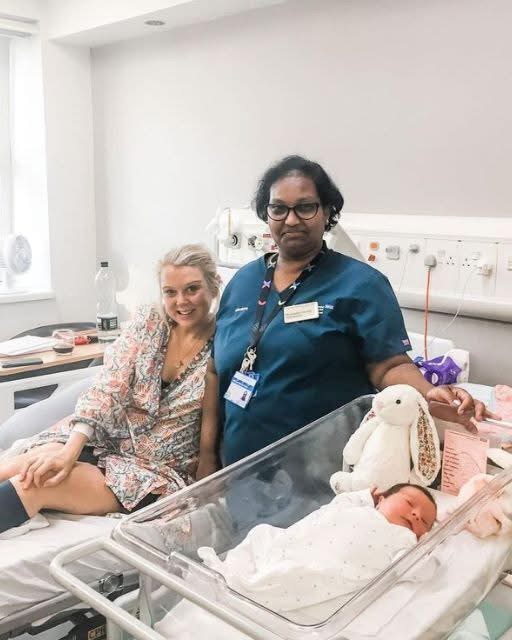I WAITED OUTSIDE THE HOSPITAL ROOM, WHILE EVERYONE ELSE GOT TO MEET MY GRANDCHILD FIRST

I never imagined I’d become that mother-in-law—the one left sitting in a hospital hallway while others were welcomed upstairs with hugs and smiles. But last week, I found myself in a stiff vinyl chair for nearly two hours, clutching a gift bag that suddenly felt like a foolish afterthought.
My son Elias, thirty, and his wife Maren, twenty-eight, had just welcomed their first child—a baby girl. I was overjoyed. I crocheted a blanket, bought the baby swing they’d registered for, even skipped a work conference to be there for the birth. Elias texted at 5 a.m.—“She’s here. Everyone’s doing well”—with a photo of the baby wrapped in that iconic striped hospital blanket. I cried over my half-burnt toast, heart swelling.
When I asked when I could come, he responded, “We’ll let you know when we’re ready for visitors. Probably late morning.” So I waited. I made coffee. Checked my bag again and again. By 10:45, I figured I’d head to the hospital and wait in the lobby—just in case. I didn’t want to intrude.
But when I arrived, I saw Maren’s sister and her husband being waved upstairs. Her parents were already there. No one stopped them, no one asked them to wait. I texted Elias: “Hey, I’m downstairs. Should I come up?” No response.
At 12:15, Maren’s best friend showed up with balloons and a camera. She smiled at the nurse, gave a name, and up she went too. Still nothing from Elias. I was about to leave—feeling both rejected and heartbroken—when the elevator opened and there he was. Elias looked exhausted, eyes red, and held something in his hand. “Mom, can we talk?”
His voice wasn’t cold or angry—it was heavy, like he’d been holding something too big to carry alone. We stepped into a quiet corner near the vending machines.
“Maren’s struggling,” he said softly. “Physically she’s fine. But emotionally… she hasn’t bonded with the baby yet. She keeps asking, ‘What if I’m not enough?’ or ‘What if she doesn’t love me?’ And now she doesn’t want anyone seeing the baby unless she feels completely safe. People who won’t judge her.”
It took me a second to grasp what he was saying. “You mean… she didn’t want me to come up?”
“It’s not about you, Mom,” he said quickly. “It’s just that… you’ve always had it together. Maren thinks you’ll see her falling apart and think less of her.”
His words hit me hard. Had I really made her feel that way? I liked being organized, yes—but I never wanted to make anyone, especially not Maren, feel small or inadequate.
“I don’t care about any of that,” I told him, my voice firm. “I just want to see my granddaughter and let Maren know she’s doing an amazing job. Nobody expects perfection—certainly not on day one.”
Elias nodded. “I know. And I believe you. But she needs time. Once she’s ready, she wants you to be the first person to meet her. I promise.”
Part of me wanted to protest, to walk right upstairs. But looking into my son’s tired, pleading eyes, I knew that wouldn’t help. Instead, I hugged him and whispered, “Tell her I’m here. Whenever she’s ready. No judgment. Just love.”
Over the next few days, I stayed away from the hospital, though every instinct in me wanted to go back. Instead, I found other ways to help. I dropped off meals at their apartment. I cleaned the nursery. I left quiet notes of encouragement around their home—each one ending with: You’re amazing parents. Take your time.
A week later, Maren texted me: Can you come over tomorrow afternoon? We’d love for you to meet Willow. Just reading her name made me tear up.
When I arrived, the house smelled of lavender and fresh laundry. Maren opened the door looking tired, but radiant. She gave me a soft hug and led me inside. Willow lay swaddled in the blanket I’d made, sleeping peacefully.
“Oh, sweet girl,” I whispered, gently touching her tiny fingers. She gripped my hand, and something shifted inside me—a quiet, overwhelming joy.
“She likes you,” Maren said, sitting beside me. “I was scared. I thought you might be disappointed in me.”
“Disappointed?” I turned toward her. “Why would I ever be disappointed?”
“Because I cry a lot. I forget to eat. I feel lost most days.”
I placed my hand over hers. “That’s called being a mother. None of us have it figured out. We just keep showing up, even when it’s hard. That’s what makes you strong.”
Her shoulders dropped, and for the first time, I saw her really smile.
In the weeks that followed, our relationship deepened. Maren began asking for advice, and I shared my stories—of mistakes, of panic, of unexpected grace. She taught me too, reminding me that motherhood is constantly evolving.
One night, as we watched Willow sleep, Maren looked at me and said, “Thank you. For waiting. I know it wasn’t easy.”
“It wasn’t,” I admitted. “But it was worth it. Because now, I get to see how strong and loving you are. You’re an incredible mom, Maren. Don’t ever forget that.”
She leaned in for a hug, and I realized something profound: love isn’t always about being first through the door. Sometimes, it’s about knowing when to step back—so someone else can grow into their own strength.
This experience taught me that patience can heal, that space can foster trust, and that true connection is built slowly, with care. If this story speaks to you, pass it on. Let someone else know it’s okay to take their time—and that love will be waiting when they’re ready.